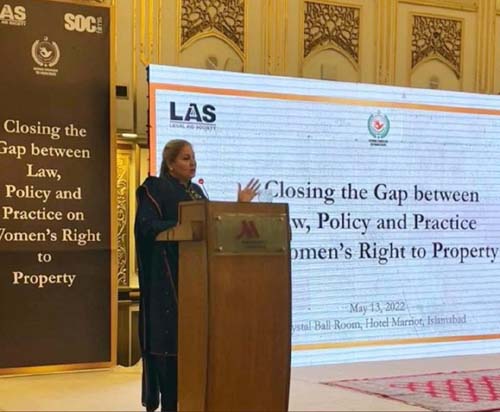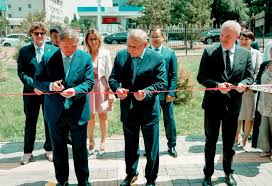Closing the gap between law, policy and practice on women’s right to property

Islamabad: Legal Aid Society [LAS], Sharmeen Obaid-Chinoy (SOC) Films and the National Commission for Human Rights(NCHR), held a conference in Islamabad to launch 5 documentaries,in an effort to spread awareness of women’s rights to property and the legal pathways provided to women to protect their rights and access the laws of Pakistan.
Indeed, a woman’s right and ability to own, inherit and control property is a key factor in achieving economic opportunity and development, empowerment, security, shelter, and livelihood. It also increases women’s power to make decisions in the household, exercise the option to leave toxic domestic environments, and build wealth and autonomy. In Pakistan, despite guarantees under law and religion enabling and protection women’s right to own and control property, women still find their control and decision-making power wrenched away from them due to retrogressive norms and socio-cultural perceptions and practices. Pakistan ranks 153 out of 156 on the World Economic Forum’s Global Gender Gap Index 2021.
To raise awareness surrounding these inheritance rights for women, SOC Films directed and produced 5 documentaries, which were showcased at this conference, highlighting issues faced by the female gender and detailing the powerful narratives of women from across Pakistan as they battle through the challenges of accessing justice to acquire their property.
“There is a general exclusion of women’s narratives from the dominant storylines we see highlighted in the discourse around economic empowerment. The narrative around empowering and uplifting women to realize their legal property rights has to be created by and with women. Society has to become receptive to hearing their experiences as opposed to drowning them down with mythical norms. This is what LAS, SOC Films and NCHR are trying to do- we are facilitating women so they can identify and explain their challenges in accessing justice and are helping them win these battles.” said Barrister Haya Emaan Zahid, CEO LAS.
“We have the legal framework in place for inheritance rights but most women, both in rural and urban areas, are unaware of the existence of these laws that protect and empower them. This lack of knowledge plays a major role in their unequal participation in the society. And with this initiative and these documentaries, we aim to help create awareness and strengthen women’s rights to property in Pakistan.” said Sharmeen Obaid-Chinoy.
“Obstructing the right to property does not only restrict financial decisions and activities, it has a direct impact on women and their basic rights to safety, security, and autonomy. This legal literacy initiative is to educate women on their inheritance rights and the ways in which they can access them.” said Rabiya Javeri Chairperson, NCHR.
The conference also contributed to the discourse on women’s right to property on various themes, including, attitudes and practices barring women’s access to property;women as invisible citizens as most women in Pakistan do not have complete documentation or CNICs;female face of poverty as most women in the cultural context of Pakistan do not possess the means or opportunity to build property or wealth;access to grievance redressal mechanisms due to lack of mobility and unsafe environment; and lack of recognition of issues as “Legal” when it comes to women due to patriarchal customs.





